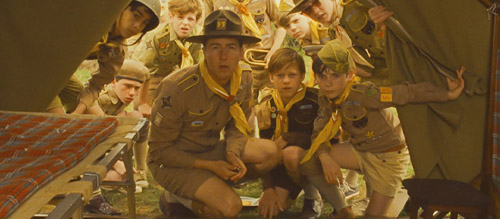
Moonrise Kingdom (2012)
Director: Wes Anderson
Screenwriters: Wes Anderson, Roman Coppola
Starring: Bruce Willis, Edward Norton, Frances Mcdormand, Bill Murray, Tilda Swinton, Harvey Keitel, Jared Gilman, Kara Hayward
Wes Anderson’s career dipped slightly in the middle to late 2000s with The Darjeeling Limited and The Life Aquatic with Steve Zissou earning relatively mediocre reviews, yet with Fantastic Mr Fox the director returned to role of critical darling, a status solidified by follow-up Moonrise Kingdom in 2012; a film that earned levels of acclaim and awards attention Anderson hadn’t received since Rushmore and The Royal Tenenbaums released over ten years earlier. Moonrise Kingdom remains one of the auteur’s most recognisable and beloved films and was widely regarded as one of 2012’s best releases, earning Oscar nominations for Anderson and his screenwriting partner Roman Coppola. It is also one of Anderson’s most personal tales, inspired in part by his own childhood.
Moonrise Kingdom earned rave reviews from most outlets upon its release with many labelling it as the filmmaker’s return to form. Empire awarded it 4 stars, saying that it was “As funny, bittersweet and as distinct as you’d expect from Wes Anderson, a director who helps you know you are not alone. Terrific performances from sprogs to stars and a lovely sense of the sorrow and joy of growing up”. Many have drawn comparisons between Moonrise Kingdom and Francois Truffaut’s The 400 Blows, which is cited as one of the pioneering films in the French New Wave movement of the 1950s and 60s. Truffaut himself has been cited amongst Anderson’s biggest influences and so it is no surprise that the French filmmaker’s iconic coming of age tale would be an influence for Anderson’s take on the genre.
In Moonrise Kingdom we follow the adventures of outcast youths Sam Shakusky, a Boy Scout attending Camp Ivanhoe’s Kaki scouts, and his friendship with Suzy Bishop. Both children run away from their respective homes and the majority of the film follows their exploits in the wild, with their respective families and the local adult community trying to rescue them. Anderson’s unorthodox approach to this tried and tested genre is to be complemented, as is the film’s use of humour.
As with the rest of Wes Anderson’s filmography, the casting of Moonrise Kingdom is impeccable. With much of the work falling on the shoulders of two relative unknowns, in Jared Gilman and Kara Hayward, much of the film could have easily gone awry, but the pair are terrific with some fantastic chemistry and heart-warming moments as well as the ability to deliver Anderson’s unique and often frenetic dialogue.
The adult cast are also on hand to offer some stalwart support, with Anderson regular Bill Murray on fine form as Susie’s overprotective father, and newcomers Frances McDormand and Edward Norton proving to be inspired choices as Susie’s mother and Scouts leader Randy Ward respectively. The standouts are, however, Bruce Willis as Island Police Captain Duffy Sharp, and Tilda Swinton as the menacing Child Services representative. Contrasting many of his action roles and showing a genuine aptitude for Anderson’s style akin perhaps to Ralph Fiennes’ transition in The Grand Budapest Hotel, Willis in particular shines in perhaps his best performance of the 2010s.
Anderson’s continued collaboration with Director of Photography Robert Yeoman hit peak form in Moonrise Kingdom, offering one of the best examples of the distinctive colour palettes available in Wes Anderson’s films. Their work together here can be marked for its use of yellows, oranges and blues, as well as particularly notable stills of the island’s locations, including its lighthouse and Scouts camp. This is one of Anderson’s most striking films, and while his style has been imitated copious amounts there can be no denying the quality of his unique visual style in this contemporary great.
Moonrise Kingdom is a charming take on adolescence, a constantly entertaining film that possesses the levels of heart and warmth audiences have come to expect from a Wes Anderson film. The cast are absolutely terrific, with the two young leads holding their own against some marquee adult cast members, and the film manages to cram a lot of detail into its 90 minute runtime whilst remaining perfectly paced. Both a fitting tribute to some of Anderson’s favourite coming of age tales and a fine film within the genre, this is one of Anderson’s greatest releases to date and perhaps the one that best showcases his visual style and unique use of dialogue.
21/24

